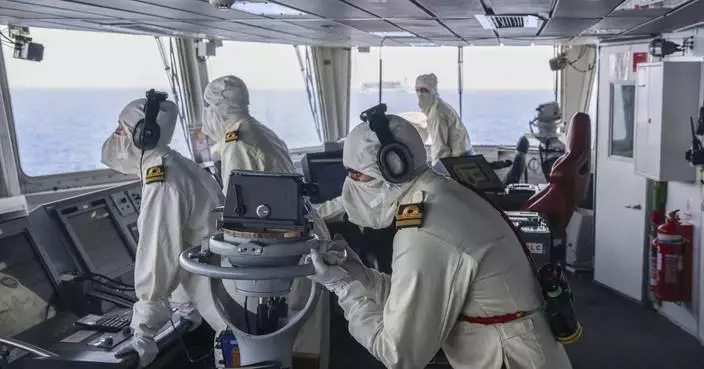Yemen's internationally recognized government signed a power-sharing deal on Tuesday with southern separatists backed by the United Arab Emirates. The deal aims to end months of infighting in the country's south.
The two groups are in an alliance against Yemen's Houthi rebels. But their deadly clashes have exposed a potential rift in the anti-Houthi bloc and threatened to further destabilize the Arab world's poorest country.
Saudi Arabia's state TV broadcast the signing ceremony in the Saudi capital, Riyadh. That's where Yemen's president, Abed Rabbo Mansour Hadi, has been in exile since 2014, when the Houthis took control of the capital Sanaa and much of northern Yemen.
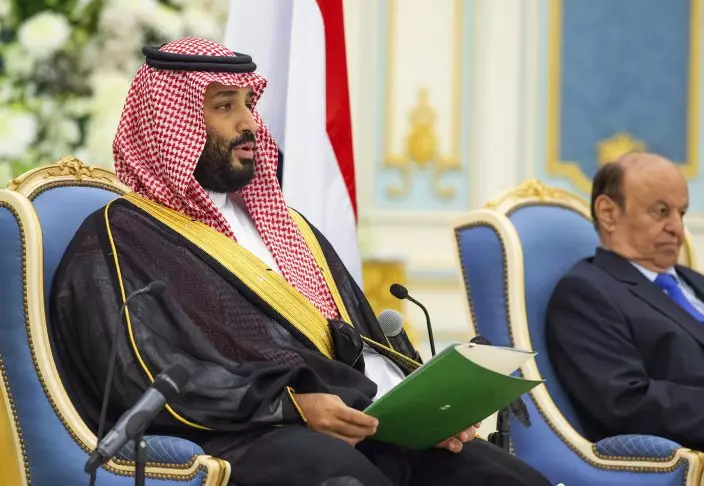
In this photo released by Saudi Royal Palace, Saudi Arabia's Crown Prince Mohammed bin Salman, left, and Yemen's President Abed Rabbo Mansour Hadi, attend the signing a power-sharing deal between Yemen's internationally recognized government and Yemeni separatists that are backed by the United Arab Emirates, in Riyadh, Saudi Arabia, Tuesday, Nov. 5, 2019. At top is a picture of Saudi Arabia's founder late King Abdul Aziz Al Saud. (Bandar AljaloudSaudi Royal Palace via AP)
In August, the UAE-backed southern separatists took control of Aden, the temporary capital, from forces loyal to Hadi, which are backed by Saudi Arabia.
Tuesday's power-sharing deal allows for President Hadi to return to Aden and envisages a new Cabinet.
A copy of the deal obtained by The Associated Press also shows the separatists agreed to disband their militias, which would be integrated into Hadi's forces within three months.
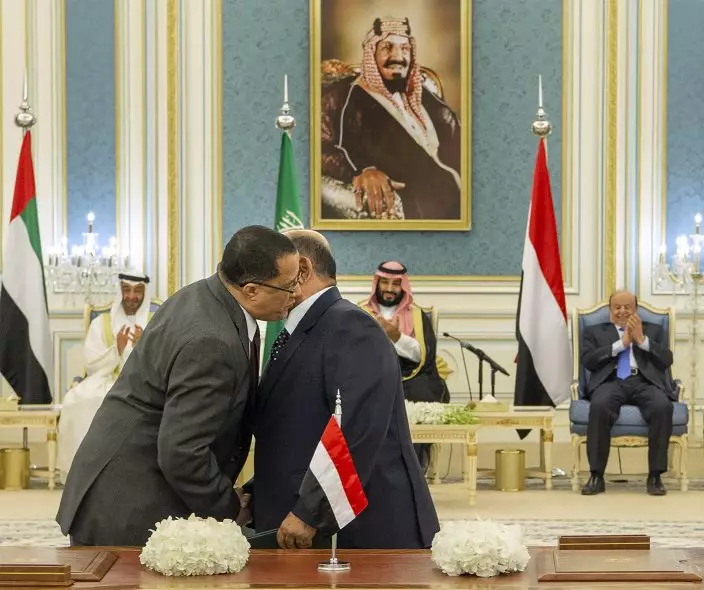
In this photo released by the Saudi Royal Palace, Yemeni Southern Transitional Council member and former Aden Governor Nasser al-Khabji, left, and Yemen’s deputy Prime Minister Salem al-Khanbashi greet each other before signing a power-sharing deal witnessed by Yemen's president, Abed Rabbo Mansour Hadi, background right, Saudi Arabia's Crown Prince Mohammed bin Salman, center, and Dhabi's Crown Prince, Mohammed bin Zayed Al Nahyan, in Riyadh, Saudi Arabia, Tuesday, Nov. 5, 2019. Yemen's internationally recognized government signed a power-sharing deal with Yemeni separatists that are backed by the United Arab Emirates. A picture of Saudi Arabia's founder late King Abdul Aziz Al Saud hangs on wall. (Bandar AljaloudSaudi Royal Palace via AP)
In return, the southern separatists are to take part in United Nations-brokered talks between Hadi's government and the Houthi rebels.
Those talks aim to end the wider conflict in Yemen, which has killed tens of thousands of people and caused near-famine conditions in some areas.
The agreement further dictates that both sides pull their forces out of Aden, and says all sides would be under the Saudi-led coalition's control. It leaves only a unit of the presidential guard in Aden to protect Hadi, while coalition forces will protect the southern separatists' leaders.
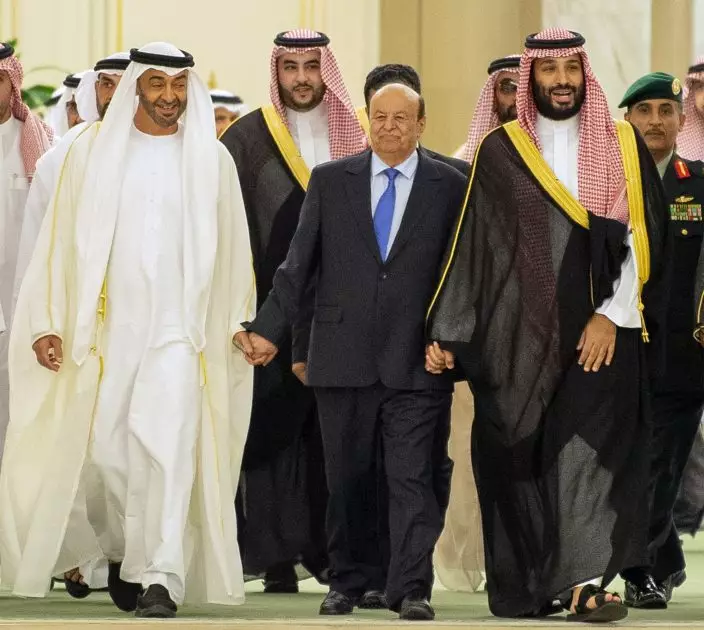
In this photo released by the Saudi Royal Palace, Yemen's president, Abed Rabbo Mansour Hadi, center, is accompanied by Saudi Arabia's Crown Prince Mohammed bin Salman, right, and Dhabi's crown prince, Mohammed bin Zayed Al Nahyan before signing a power-sharing deal in Riyadh, Saudi Arabia, Tuesday, Nov. 5, 2019. Yemen's internationally recognized government has signed a power-sharing deal with Yemeni separatists that are backed by the United Arab Emirates. The deal aims to halt months of infighting between the two groups. (Bandar AljaloudSaudi Royal Palace via AP)
Peter Salisbury, Yemen expert at the Crisis International Group, a Brussels-based think tank, said the agreement solves two short-term problems, if it can be successfully implemented. It prevents a war-within-a-war between the southern separatists and Hadi's government. It also provides more credibility to future government negotiations with the Houthis.
However, Salisbury cautioned that the agreement "is loosely worded, and open to interpretation ... and sets an ambitious timeline for implementation."
Attending the ceremony were Saudi Crown Prince Mohammed bin Salman and Abu Dhabi's crown prince, Mohammed bin Zayed Al Nahyan. Also present was Aidarous al-Zubaidi, the head of the secessionist Southern Transitional Council.
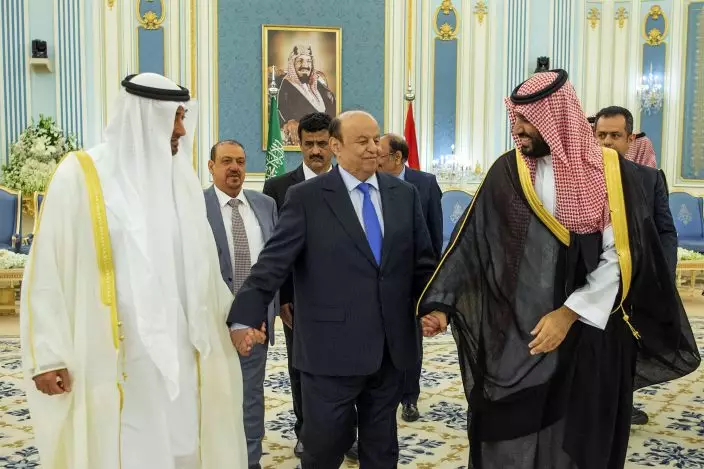
In this photo released by the Saudi Royal Palace, Yemen's president, Abed Rabbo Mansour Hadi, center, is accompanied by Saudi Arabia's Crown Prince Mohammed bin Salman, right, and Dhabi's crown prince, Mohammed bin Zayed Al Nahyan before signing a power-sharing deal in Riyadh, Saudi Arabia, Tuesday, Nov. 5, 2019. Yemen's internationally recognized government has signed a power-sharing deal with Yemeni separatists that are backed by the United Arab Emirates. The deal aims to halt months of infighting between the two groups. (Bandar AljaloudSaudi Royal Palace via AP)
Saudi Arabia has in the past weeks increased its military presence in southern Yemen, airlifting in additional troops, armored vehicles, tanks and other military equipment.
The UAE has since July been pulling troops out of Yemen, leaving the coalition with a weakened ground presence and fewer tactical options.








